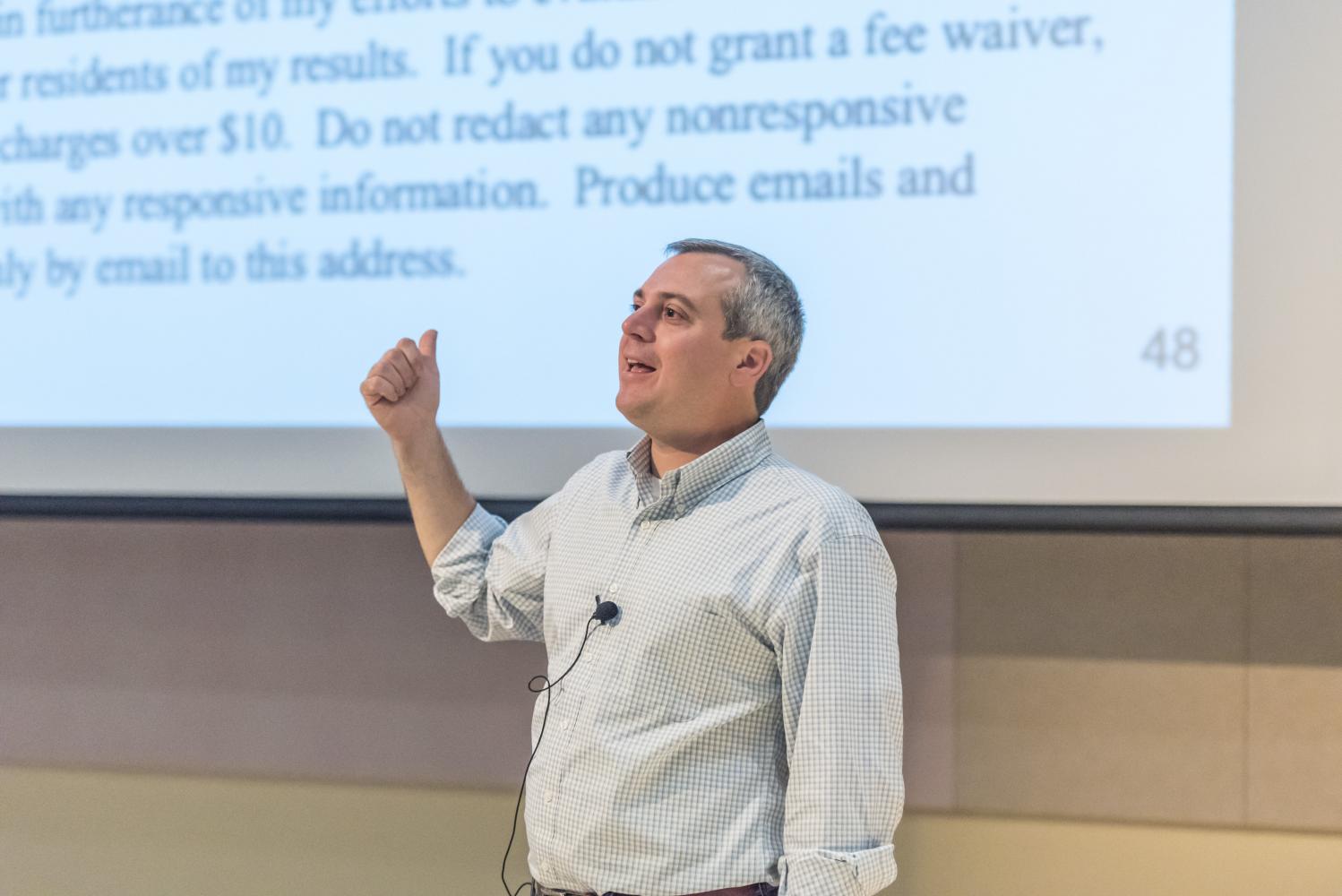
Matt Topic, a Chicago-based FOIA attorney at Loevy & Loevy, has taken on some of the biggest public records paces of the past few years, managing to win important precedent after precedent.
He shares what he looks for when considering litigation, why public records matter, and how he accidentally fell into transparency law in the first place.
How did you kind of get into public records litigation?
It’s funny because it feels like the most natural thing but I really kind of backed into it. After law school I was working at a big corporate law firm. I was doing intellectual property litigation, but I was also doing pro bono work and originally thought I wanted to focus my pro bono work on environmental law.
The first environmental law pro bono project I did was to help an environmental activist get records about an environmental issue in the Chicago area under FOIA. I really enjoyed that so I just completely pivoted and started to do FOIA cases.
I had a friend at the same firm who had been an intern at the Better Government Association in Chicago. He was starting to get a stream of pro bono FOIA cases that way, so we started working on those together and it’s just kind of went from there. But that was just a pro bono practice.
About three years ago, after seeing that we could actually recover fees in theses cases when we prevail, I put together a business plan to make it the core part of my legal practice. I shopped around a few firms and found a civil rights firm that was a good fit and then I just took a jump to see whether I could really make it work as a full time practice. It’s been triple full time or more. So it’s been cool.
There’s a huge demand for FOIA representation that is not even remotely being met. What I’ve done is different from what I think what a lot of lawyers who are more media law generalists do. If I have a client that can afford to pay me, then I’m happy to have him pay me, but that’s pretty rare. So we just take on cases where we don’t charge our clients anything, or if they have the ability to guarantee some amount of fees, then we ask them to do that, but for the most part we just take a bunch of cases with the hope that we win them and then collect our fees if we win. And we’ve done pretty well at that, so it’s proven to actually work as a legal practice.
You have a remarkable track records to show for that. Those kinds of laws - that allow attorneys to recoup fees - vary widely from state to state. Do you think these kinds of laws have an impact on A) the kind of suits that get brought and B) agencies that have to pay fees taking public records more seriously afterwards?
It makes a tremendous difference. I couldn’t possibly overstate it.
If the law said that there was no possibility of fee recovery then I would be filing about one percent - if I’m lucky - of the cases I’m filing. It just doesn’t work. It only works for non-profits who have their own in-house lawyers or it works for media companies who have enough money to pay lawyers to go to court. And even then newsroom budgets are not what they once were so even that’s getting tougher.
In the states where fee recovery is discretionary it’s more risk, because you just don’t know if you’ll get fees even if you win. In Illinois it’s “shall award” in the statute, so the courts award reasonable attorney fees if you prevail. And that opens up so many more cases that I can bring. If you took that away it would seriously interfere with the ability of people to have their request honored.
In terms of what does that do to public body compliance … for three years now I have been suing the Chicago Police Department at a rate of probably a lawsuit a month and it’s very slowly caused change. Early on it was case after case where they just didn’t respond to requests for months … and it’s a five to 10 business day deadline in Illinois. And that still happens, though not as frequently. I think they have devoted more resources to it, but I think it’s still the case that most public bodies just don’t feel like there are significant enough ramifications for violations. The bad press from being sued is maybe enough to get the more politically motivated agencies to get more compliant. But unfortunately, there are a lot of the same entities that we have to sue over and over again.
What are some of the things that you look at that are and think this might be better to litigate versus this might not be such a good target?
Obviously the legal merits - is there a good argument? In a decent percent of cases it’s completely clear that we’re right. In another decent number of cases, it’s maybe not yet been established in any specific case that we’re right, but we’re gonna be right. And then we still take a decent chunk of cases where there isn’t necessarily a clear answer until we fight it. Obviously you want a case that’s good on the merits, but sometimes you don’t really necessarily know which way it’s going to come out. Lawyers have this cliché that says, “bad facts make bad laws.”
I don’t really get too involved in, who is this person, why are they asking for these records, or what are they going to do with the records. I generally don’t get too involved in that, but judges I think do tend to kind of give a little thought to that as well. So if the legal issue isn’t settled, I look at whether this is the ideal request or the ideal requester to push the issue.
What we’ve found is that the bigger the magnitude of the harm that would result from a release of the records the more likely the courts will give deference to the government. No judge want to be the one who released a record that then allowed a terrorist to poison the water supply, right?
Sometimes we do sort of build up as well. We’ve done a lot with private email accounts and I think it worked pretty well. Really the main case was the Mayor and that’s optically an even more compelling case than rank and file government employees. Because the city has argued in those cases it’s this big invasion of privacy.
Going back to bad facts make bad law, is there a concern that a few people may file bad lawsuits and ruin things for everybody?
Definitely and we see that. Unfortunately, a lot of times courts don’t necessarily give prison inmate FOIA requesters the same … I don’t want to say respect, but they don’t take their arguments as seriously and they are more likely to just give them the back of the hand. And sometimes that’s resulted in law that’s not favorable.
One that we’ve done a few cases on is when government privatizes the governmental function, are those records still subject to FOIA? And we have some law on it but it’s really underdeveloped. We took the case all the way through the Illinois Supreme Court and we lost, but we did get the legal principle established. We just lost under the facts of our case. But the opportunity was there and the state Supreme Court took the case, so when an opportunity arises you gotta grab it.
Sometimes I think some organizations wait too long, or they are a little too hesitant, or it’s never the right time, or it’s never the right case, and what I say is if I see I have three or four different cases I can bring on the same legal principle, I’ll pick the one or two that just feel the best to me, but if there’s a good case and the facts are good - if they’re bad facts you don’t want to do it - but if it’s questionable and the opportunity is there, I tend to err on the side of, well, let’s file it and see what happens. In other words you can get in this paralysis where you just wait and wait and you never actually bring a case.
Image via Better Government Association
When a requester comes to you, do they usually get you involved before they file the first request or when they get their first rejection? What’s your ideal scenario in terms of a requester keying up successful litigation?
It’s a mix. I do have some people contact me who say I’m interested in something, and sometimes I can do that. A lot of times that’s more a question of expertise in the subject matter than it is on any kind of FOIA expertise. But usually people come to me after they’ve gotten a rejection.
I’m happy always to talk to people before they make the request, but what I usually say to them anyway is let’s make the request and let’s get the response and then we can deal with it rather than try to predict what all of the outcomes are going to be because I think people sometimes forget that you can make request after request, you can keep modifying until you get to the request you need to get to. So make your request, and if they come back and say well that’s vague because of x, y and z, well maybe it was and then you can fix it and make the next request. I think people can tend to overthink making the request and try to make it completely perfect form the get go and there’s plenty of opportunity to adjust that as time goes on.
So it’s not at all uncommon that someone will come to me with a denial and I’ll say I see what you’re getting at but the way that you asked for it implicates this other issue, so they’re right but if you modify it and do it this way and they deny it again then we would be in a better position to fight it. So I’m happy to work on them before they go out but usually they come to me after there’s been a denial and we’re thinking about what to do next.
Are there any resources that you point people to for them to file better requests or to avoid some of the exemptions they might otherwise hit?
You guys do good work obviously. The Reporters Committee for the Freedom of the Press has some good materials. I think just reading a lot of reporting about records issues and FOIA-based reporting. I think there is a lot you can learn from that. Reporters like Jason Leopold make many requests and they write about them all the time and you can look at those requests and learn a lot about, for example, how FBI records are being kept and what are all the different ways they’ll try to screw you. So there’s a lot of learning … and I think that sharing information among people about what’s worked and what hasn’t worked is important.
You’ve had a number of important legal wins, particularly around the shooting of Laquan McDonald. What victories are you particularly most proud of, whether just because it was a good case or set a really good precedent?
Yeah, I mean obviously that one was pretty huge and significant and really speaks to the power of information. There’s so much discussion and so many things happening around policing in Chicago and there’s a ton left to do, but that didn’t come about because somebody got elected on a platform to change something. It changed because information was out there and it exposed something and led to this huge public outcry. It was sort of, to me, a huge vindication of the value of open records and what it can lead to.
The Rahm Emanuel private email case was a big one too, because that was a really important legal principle. We cannot have public officials using private email accounts in order to evade public records laws.
What was so interesting is that people thought there were gonna be these smoking guns, like the mayor admitting he had seen the Laquan McDonald video and told the law department to bury it. The guy isn’t stupid, and there weren’t emails like that.
But there was this really interesting snapshot into this super class of people who have access to the mayor in a way that the rest of us don’t. What it reminded me of was one of those scenes in a movie where the king is sitting on the throne and all of the nobles one at a time are coming up to the king with their requests. It was just like the modern day electronic version of that. And so I think it just really exposed … it didn’t expose any huge piece of wrongdoing, it did expose some improper lobbying by a few different people, including David Plouffe, who was previously in the Obama administration and was lobbying on behalf of Uber without registering.
So it was a very clear picture into how city government actually operates. But I’ve done lots of cases just for individual people who just found random individually interesting things. Like villages that spend way too much money on staff parties and staff gifts at the same time they’re trying to increase their tax liability.
The case I did for Freddy Martinez on Chicago Police Department and StingRays was very satisfying. That was very, very hard fought. It was a massive undertaking, to really figure out what was already known and they were throwing arguments at us under like arms trade regulations and the whole kitchen sink that the Harris Corporation, for years, had been asserting.
For every one of the big ones like that, there’s another ten where the records matter a lot to some person, maybe they’re just in a small town that doesn’t get a lot of media coverage, the local paper isn’t doing any significant investigative reporting. I love those cases, where it’s something that otherwise would have fallen through the cracks and never been looked at and it’s just people taking the initiative and caring enough to file a request - it’s good stuff for democracy.
Image by Roman Boed via Flickr and licensed under Creative Commons BY-SA 2.0.





